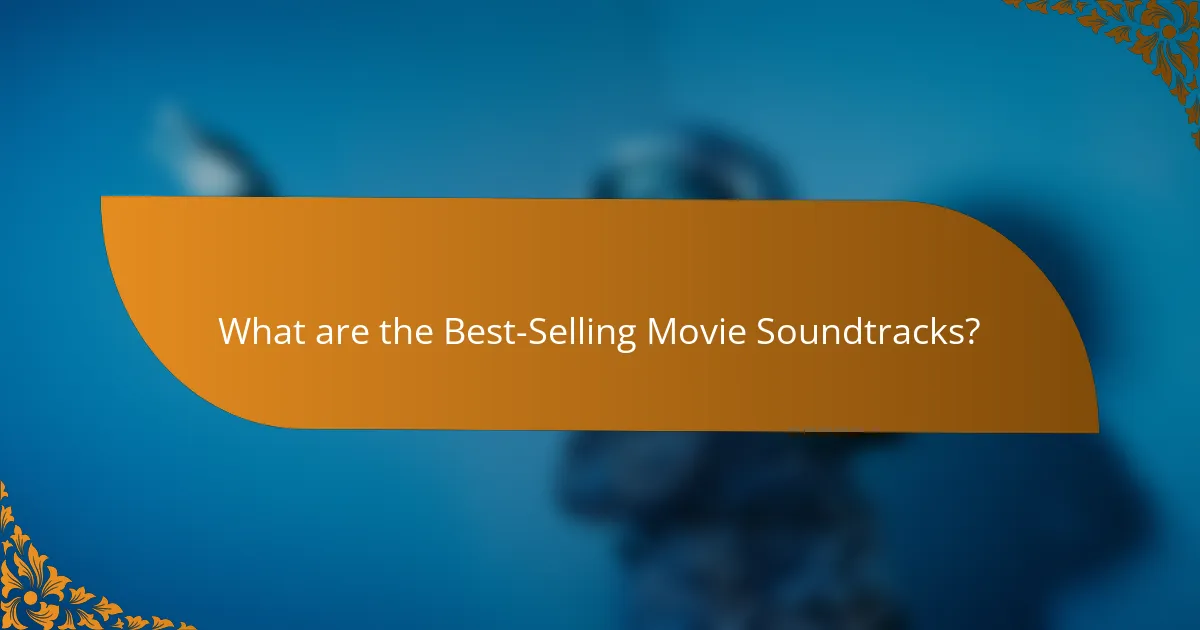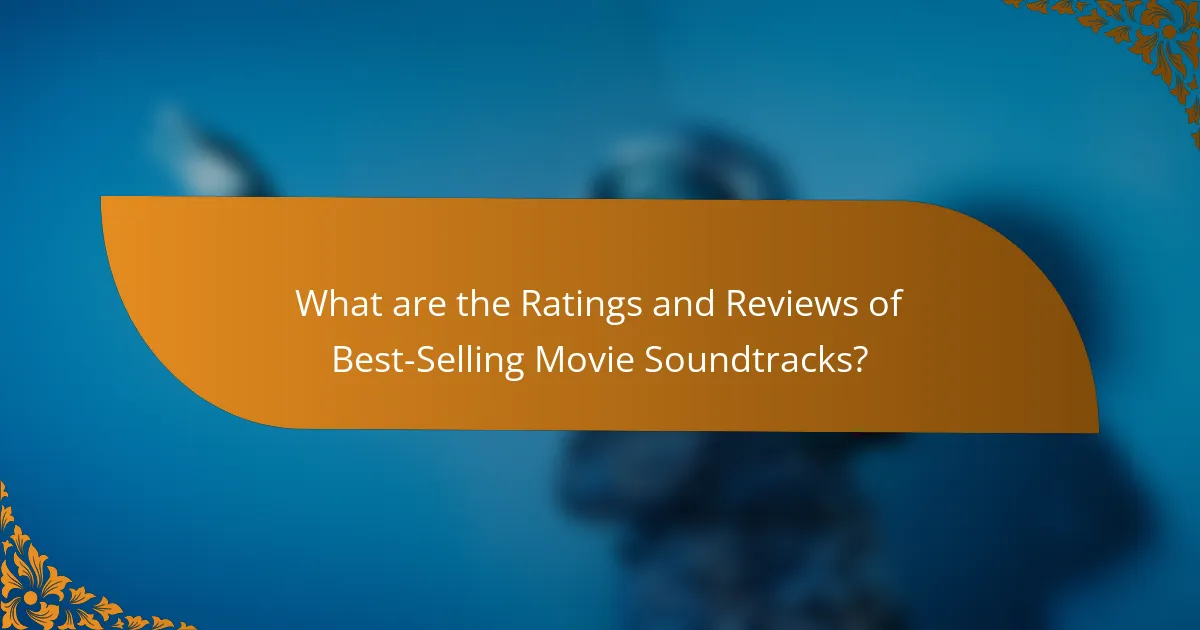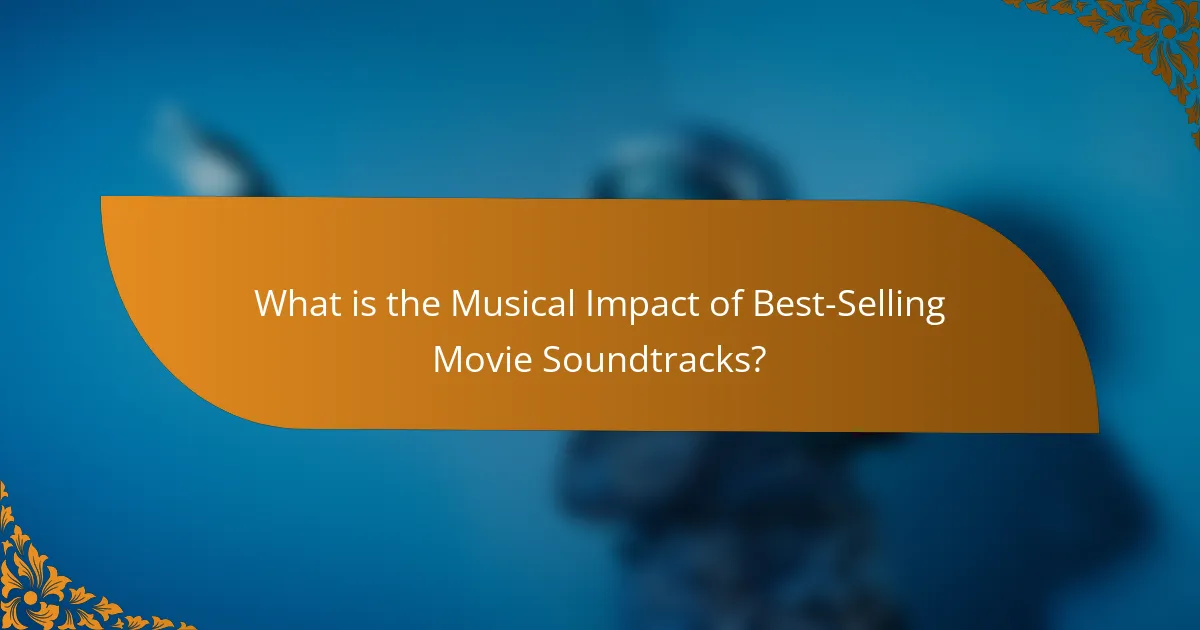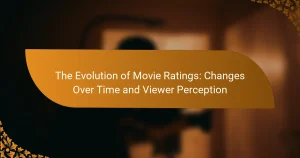
What are the Best-Selling Movie Soundtracks?
The best-selling movie soundtracks include “The Bodyguard,” “Titanic,” and “O Brother, Where Art Thou?” “The Bodyguard” soundtrack, featuring Whitney Houston, has sold over 45 million copies worldwide. “Titanic,” with its iconic score by James Horner, has also surpassed 30 million sales. “O Brother, Where Art Thou?” achieved significant success, selling over 8 million copies. These soundtracks have made a lasting impact on music and film, contributing to their commercial success.
How are movie soundtracks categorized as best-selling?
Movie soundtracks are categorized as best-selling based on their sales figures and chart performance. The Recording Industry Association of America (RIAA) certifies albums based on sales thresholds. For example, a gold certification requires 500,000 units sold, while platinum requires 1 million. Billboard charts also track album sales, providing rankings that reflect popularity. Best-selling soundtracks often feature chart-topping singles. Soundtracks from blockbuster films typically achieve higher sales due to their widespread exposure. Historical data shows that soundtracks like “The Bodyguard” and “Frozen” have reached multi-platinum status, reinforcing their classification as best-selling.
What criteria determine the sales figures of movie soundtracks?
Sales figures of movie soundtracks are determined by several key criteria. Popularity of the film significantly influences soundtrack sales. A successful movie often leads to higher soundtrack sales due to increased visibility. The inclusion of hit songs from well-known artists can boost sales figures. Soundtracks featuring chart-topping singles tend to perform better. Marketing strategies play a crucial role in promoting the soundtrack. Effective advertising can enhance public awareness and interest. Timing of the release is also important; soundtracks released alongside the film often see higher sales. Additionally, critical acclaim and positive reviews can drive consumer purchases. For example, soundtracks associated with award-winning films frequently achieve higher sales.
Which metrics are used to rank best-selling soundtracks?
Sales figures are the primary metric used to rank best-selling soundtracks. This includes both physical and digital album sales. Chart performance is also significant, often measured through Billboard rankings. Streaming numbers contribute to the overall metric as well. Critical acclaim and reviews can influence public perception and sales. Awards and nominations, such as Grammys, add prestige and visibility. Historical context, like cultural impact, can also affect long-term sales. These metrics together provide a comprehensive view of a soundtrack’s success.
Why are movie soundtracks important in the film industry?
Movie soundtracks are crucial in the film industry because they enhance the emotional experience of the audience. Soundtracks set the tone and atmosphere of a film, guiding viewers’ emotional responses. They can evoke specific feelings such as joy, sadness, or tension. For instance, the score of “Star Wars” by John Williams is iconic for its ability to create excitement and adventure. Additionally, soundtracks can help in character development by reflecting their inner thoughts and emotions. A well-composed soundtrack can also contribute to a film’s commercial success. According to a study by the University of Southern California, films with strong soundtracks often achieve higher box office revenues. Overall, soundtracks play a vital role in storytelling and audience engagement in cinema.
How do soundtracks enhance the storytelling experience?
Soundtracks enhance the storytelling experience by providing emotional depth and context. They evoke specific feelings that align with the narrative. For instance, a suspenseful score can heighten tension during critical moments. Conversely, a romantic melody can amplify emotional connections between characters. Research shows that music can influence audience perception and memory. A study by the University of Southern California found that soundtracks significantly affect how viewers remember scenes. This demonstrates the powerful role of music in shaping audience engagement. Soundtracks also help establish the setting and period of a story. They create an immersive environment that draws viewers into the narrative.
What role do soundtracks play in a movie’s marketing strategy?
Soundtracks play a crucial role in a movie’s marketing strategy by enhancing the film’s emotional appeal and brand identity. They create a memorable auditory experience that can resonate with audiences. A well-chosen soundtrack can boost audience engagement and increase anticipation before the film’s release. For example, the soundtrack of “Guardians of the Galaxy” contributed significantly to its box office success, reaching over $770 million worldwide. Additionally, soundtracks often generate additional revenue through sales and streaming, further promoting the film. They also serve as a promotional tool, appearing in trailers and advertisements to attract viewers. Overall, soundtracks are integral to shaping a movie’s marketing narrative and expanding its reach.
What are some notable examples of best-selling movie soundtracks?
Notable examples of best-selling movie soundtracks include “The Bodyguard,” “Titanic,” and “Frozen.” “The Bodyguard” soundtrack, featuring Whitney Houston, sold over 45 million copies worldwide. “Titanic,” with its iconic score by James Horner, sold around 30 million copies. “Frozen,” featuring the hit song “Let It Go,” has surpassed 10 million copies in sales. Other significant soundtracks include “Saturday Night Fever,” which sold over 40 million copies, and “The Lion King,” with sales exceeding 20 million. These soundtracks have made a lasting impact on popular music and culture.
Which soundtracks have achieved iconic status?
Iconic soundtracks include “The Sound of Music,” “Star Wars,” and “Titanic.” “The Sound of Music” features timeless songs like “My Favorite Things.” It has won five Academy Awards. “Star Wars” introduced John Williams’ memorable score. It became a cultural phenomenon and won several Grammy Awards. “Titanic” features Celine Dion’s “My Heart Will Go On.” This song topped charts worldwide and won an Oscar for Best Original Song. Other notable soundtracks are “Grease,” “The Lion King,” and “Pulp Fiction.” Each of these soundtracks has had a significant impact on music and film culture.
What impact did these soundtracks have on popular culture?
Soundtracks have significantly influenced popular culture by shaping musical trends and enhancing cinematic experiences. They often introduce new genres or revive interest in existing ones. For instance, the “Guardians of the Galaxy” soundtrack popularized classic rock among younger audiences. Similarly, “The Bodyguard” soundtrack, featuring Whitney Houston, dominated charts and won multiple awards. These soundtracks contribute to the cultural zeitgeist, often becoming synonymous with the films they accompany. They also impact fashion, dance, and social movements, as seen with the “Saturday Night Fever” soundtrack’s influence on disco culture. Overall, soundtracks serve as cultural artifacts that reflect and shape societal values and trends.

What are the Ratings and Reviews of Best-Selling Movie Soundtracks?
Best-selling movie soundtracks generally receive high ratings and positive reviews. For example, the soundtrack for “The Bodyguard” achieved over 45 million copies sold, earning a 5x Platinum certification. Critics often praise soundtracks like “Guardians of the Galaxy” for their nostalgic track selection and cohesive flow. The “Frozen” soundtrack, with over 10 million copies sold, garnered acclaim for its catchy songs and strong vocal performances. Soundtracks frequently appear on Billboard charts, with many reaching number one positions. Overall, these soundtracks are celebrated for their ability to enhance the film experience and resonate with audiences.
How are movie soundtracks rated by critics and audiences?
Movie soundtracks are rated by critics and audiences through various platforms and criteria. Critics often assess soundtracks based on composition, thematic relevance, and emotional impact. They provide reviews in publications and online platforms, assigning star ratings or scores. Audiences typically express their opinions through ratings on sites like IMDb and Rotten Tomatoes. User reviews and ratings reflect personal enjoyment and the soundtrack’s connection to the film. Additionally, sales figures and streaming statistics serve as indicators of a soundtrack’s popularity. For example, soundtracks from films like “The Lion King” and “Guardians of the Galaxy” have received high ratings and commercial success, demonstrating their positive reception.
What platforms provide ratings for movie soundtracks?
IMDb, Rotten Tomatoes, and Metacritic provide ratings for movie soundtracks. IMDb features user ratings and reviews for soundtracks. Rotten Tomatoes aggregates critic reviews and audience scores. Metacritic offers a weighted average score based on reviews from various critics. These platforms are widely recognized for their comprehensive rating systems. They serve as valuable resources for assessing the quality of movie soundtracks.
How do audience reviews differ from critical reviews?
Audience reviews differ from critical reviews primarily in perspective and criteria. Audience reviews reflect personal feelings and subjective experiences. They often emphasize emotional impact and entertainment value. In contrast, critical reviews focus on technical aspects and artistic merit. Critics assess elements like composition, production quality, and originality. Audience reviews can be influenced by popularity and trends. Critical reviews are typically more analytical and informed by industry standards. This distinction shapes how each group perceives and rates soundtracks.
What factors influence the reviews of movie soundtracks?
The reviews of movie soundtracks are influenced by several key factors. These factors include the emotional impact of the music on the audience, the relevance of the soundtrack to the film’s narrative, and the popularity of the artists involved. Additionally, the quality of the composition and production plays a significant role. Critics often assess how well the soundtrack complements the film’s themes and scenes. User reviews may reflect personal preferences and cultural context. Historical context also matters; soundtracks that evoke nostalgia may receive higher ratings. Overall, a combination of artistic merit and audience reception shapes the reviews of movie soundtracks.
How does the composition affect the overall reception?
The composition of a movie soundtrack significantly influences its overall reception. A well-crafted composition enhances the emotional impact of a film. It can evoke specific feelings in the audience, such as joy, sadness, or tension. For instance, the use of orchestral arrangements often elevates dramatic scenes. Conversely, poorly executed compositions can detract from the viewer’s experience. Studies show that soundtracks with memorable melodies tend to receive higher ratings. Additionally, soundtracks that complement visual elements create a more immersive experience. This synergy between music and film is crucial for audience engagement.
What role do featured artists play in the soundtrack’s success?
Featured artists significantly enhance a soundtrack’s success. Their inclusion can attract diverse audiences and increase sales. Popular artists bring established fan bases, boosting visibility. Collaborations often result in unique musical styles that appeal to listeners. Featured artists can also generate buzz through media appearances and promotions. This increased attention can lead to higher streaming numbers and chart placements. For example, the soundtrack of “Black Panther” featured artists like Kendrick Lamar, contributing to its commercial success and critical acclaim.

What is the Musical Impact of Best-Selling Movie Soundtracks?
Best-selling movie soundtracks significantly influence popular music trends and cultural perceptions. They often introduce new artists to mainstream audiences. For instance, the “Guardians of the Galaxy” soundtrack revitalized classic songs from the ’70s and ’80s. This led to a resurgence in vinyl sales and increased streaming of those tracks. Additionally, soundtracks can enhance the emotional impact of films, creating memorable associations with specific songs. The “Titanic” soundtrack, featuring Celine Dion’s “My Heart Will Go On,” is a prime example of this phenomenon. It achieved massive commercial success, selling over 30 million copies worldwide. Overall, best-selling movie soundtracks shape musical tastes and cultural moments.
How do movie soundtracks influence music trends?
Movie soundtracks significantly influence music trends by introducing new genres and artists to mainstream audiences. They often feature popular songs that gain traction through film exposure. For example, the “Guardians of the Galaxy” soundtrack revived interest in classic rock. This revival led to increased sales and streaming of tracks from the 1970s and 1980s. Additionally, soundtracks can create cultural moments that shape music preferences. The success of soundtracks like “A Star is Born” showcases how film can elevate contemporary artists. Such soundtracks also inspire cover versions and remixes, further influencing the music landscape. Overall, movie soundtracks serve as a catalyst for music trends and artist popularity.
What genres have been popularized by movie soundtracks?
Movie soundtracks have popularized several genres, including orchestral, rock, pop, hip-hop, and electronic music. Orchestral music became prominent through films like “Star Wars,” which showcased grand compositions. Rock music gained popularity with soundtracks like “Guardians of the Galaxy,” featuring classic hits. Pop music has been widely featured, as seen in “The Bodyguard,” which propelled Whitney Houston’s songs to the top. Hip-hop gained traction through soundtracks like “8 Mile,” which highlighted Eminem’s work. Electronic music was popularized by films like “The Matrix,” showcasing its unique soundscapes. Each genre’s integration into film has significantly impacted its mainstream acceptance and growth.
How do soundtracks contribute to the careers of artists?
Soundtracks significantly enhance the careers of artists by providing exposure and new audiences. They often feature popular songs that can lead to chart success. For example, the “Guardians of the Galaxy” soundtrack revitalized older tracks, boosting their streaming numbers. Collaborating on soundtracks can also establish artists in the film industry. Many artists gain recognition through soundtrack placements, leading to increased album sales. Additionally, soundtracks can enhance an artist’s brand by associating them with successful films. This association can lead to further opportunities in music and beyond.
What are the long-term effects of popular soundtracks on music culture?
Popular soundtracks significantly shape music culture over time. They influence genre trends and introduce new artists to mainstream audiences. For example, the soundtrack of “Guardians of the Galaxy” revived interest in classic rock. This led to a resurgence of vinyl sales and increased streaming of older songs. Popular soundtracks also create cultural touchstones that resonate across generations. They often lead to the blending of musical styles, as seen in the success of “Hamilton,” which fused hip-hop with Broadway. Furthermore, soundtracks can elevate the status of specific musical genres, as seen with the rise of orchestral scores in film. Overall, popular soundtracks serve as a bridge between cinematic experiences and musical exploration.
How do soundtracks shape listener preferences over time?
Soundtracks shape listener preferences over time by creating emotional connections and reinforcing memories. They evoke specific feelings associated with scenes in films. This emotional engagement can lead to repeated listening and increased familiarity. Familiarity often enhances preference for certain genres or artists featured in soundtracks. Studies show that repeated exposure to music influences listener taste. For example, the mere exposure effect suggests that people tend to prefer what they frequently hear. Additionally, soundtracks can introduce listeners to new music styles. This exposure can expand musical horizons and alter preferences over time. Furthermore, memorable soundtracks often become cultural touchstones, influencing broader musical trends.
What legacy do successful soundtracks leave in the music industry?
Successful soundtracks leave a significant legacy in the music industry by influencing trends and shaping genres. They often introduce new artists to mainstream audiences, creating lasting careers. For example, the “Guardians of the Galaxy” soundtrack revitalized interest in classic rock. Soundtracks can also drive album sales and streaming numbers, as seen with “Frozen,” which sold over 10 million copies. Additionally, they enhance the emotional impact of films, leading to increased cultural resonance. Successful soundtracks often receive awards, affirming their artistic value. This recognition can lead to innovative collaborations and cross-genre experimentation. Overall, they play a crucial role in bridging film and music, creating a shared cultural experience.
What are some tips for exploring best-selling movie soundtracks?
To explore best-selling movie soundtracks, start by researching popular soundtrack charts. Websites like Billboard and Spotify provide updated rankings. Look for critically acclaimed soundtracks from notable films. Analyze reviews from music critics and film enthusiasts for deeper insights. Listen to complete albums rather than just singles to appreciate the full musical context. Attend live performances or concerts featuring soundtrack music for a unique experience. Join online forums or social media groups focused on soundtracks to engage with fellow fans. Utilize streaming services to create playlists of best-selling soundtracks for easy access.
How can listeners discover new soundtracks effectively?
Listeners can discover new soundtracks effectively by utilizing streaming platforms and music recommendation services. These platforms often feature curated playlists specifically for soundtracks. Users can explore categories like “Film Scores” or “Movie Soundtracks.” Additionally, following music blogs and websites that specialize in film music can provide insights into new releases. Engaging with social media groups focused on film music can also lead to recommendations. Listening to film reviews and podcasts that discuss soundtracks can introduce listeners to new works. Finally, attending film festivals or soundtrack launch events allows for firsthand exposure to new music.
What resources are available for soundtrack enthusiasts?
Soundtrack enthusiasts have access to various resources. Online platforms like Spotify and Apple Music offer extensive libraries of movie soundtracks. Websites such as IMDb provide detailed information about soundtracks associated with films. Social media groups and forums allow fans to discuss and share their favorite soundtracks. Additionally, blogs and podcasts focus specifically on film music analysis and reviews. Books on film scoring and soundtrack history are also valuable resources. These resources help enthusiasts explore, discover, and appreciate soundtracks more deeply.
Best-selling movie soundtracks are defined by their significant sales figures and cultural impact, with notable examples including “The Bodyguard,” “Titanic,” and “O Brother, Where Art Thou?” The article examines how soundtracks are categorized as best-selling based on sales metrics, chart performance, and the influence of featured artists. It also explores the role of soundtracks in enhancing the emotional experience of films, their contribution to marketing strategies, and their long-term effects on music culture. Additionally, the article provides insights into the ratings and reviews of soundtracks, highlighting the factors that influence their reception and legacy in the music industry.


